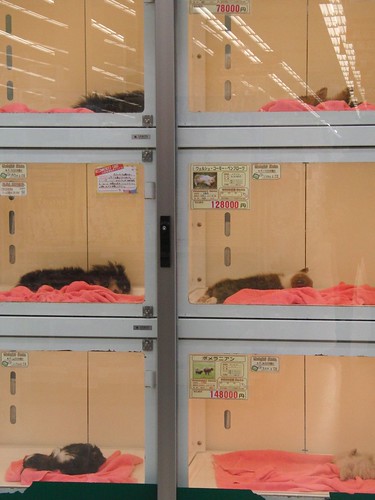東京の中で、女の子が一人ありました。彼女の名前はエリでした。エリちゃんは8歳で小学校生でした。いつも犬が欲しかったです。でも、エリちゃんのお兄さんは動物にアレグギーがありましたから、犬を飼っていませんでした。
キンコンカンコン〜 夏休みが始まりました!
エリちゃんは「ただいま!」と言いました。お母さんは「お帰り、エリ」と言いました。「パパとママはプレゼントがあります。」
「プレゼント?私に上げます?」
「はい、エリちゃんのプレゼントです。でも、ここでありません。さぁ、車で行きましょう。」
エリちゃんはびっくりしました!ペットの店に来ました。
「犬を買いに来ますね!」と言いました。両親を笑いました。
犬を泣きました。「ワンワン!ワンワンワン!」大きいの犬は「ヲオオオオオオオン」と泣きました。エリちゃんは「ちょっとこわい!」と思いました。
上から三段目でかわいい犬がいました。泣きませんでした。エリちゃんは「ね、ママ!」と言いました。「この犬はどう?」
「ん、いいですね。」エリちゃんの両親は店員と話しにいきました。エリちゃんは犬と遊びました。そして、エリちゃんの両親とエリちゃんとエリちゃんの新しい犬に帰りました。
上から三段目でかわいい犬がいました。泣きませんでした。エリちゃんは「ね、ママ!」と言いました。「この犬はどう?」
「ん、いいですね。」エリちゃんの両親は店員と話しにいきました。エリちゃんは犬と遊びました。そして、エリちゃんの両親とエリちゃんとエリちゃんの新しい犬に帰りました。
-----
Explanation of katakana used:
エリ: while it is uncommon, some Japanese people are given katakana or hiragana first names
アレグギー (allergy): this is a loanword from English
キンコンカンコン: this is an onomatopoeic description of the sound of a school bell
コロンビア大学 (Columbia University): katakana is used because Columbia is a foreign name
パパ and ママ: because Eri is a little girl, she still calls her parents papa and mama instead of moving towards using other words like 母 or 父. These are technically not Japanese words, though, so they are represented in katakana.
プレゼント (present): this is a loanword from English
ペット屋 (pet store): this is a combination of a loanword from English (pet) with the Japanese 屋 (store)
ワンワン and ヲオオオオオオオン: these are onomatopoeias for the sounds that the dogs in the shop made
The katakana used in my piece represent many of the ways katakana is used, including names, onomatopoeia/sound effects, and loanwords. I did not present an example of emphasis because it seems to be used most often in printed media that relies on appearance, such as advertisements or manga, and not in stories.





Interesting story! You pointed out that some Japanese have katakana Japanese name, but I am not sure whether that's their official name or simply nickname.
返信削除I really liked the onomatopoeia of the school bells. Sadly, due to my limited Kanji reading skills, I was unable to follow as much as perhaps I would have liked. :(
返信削除I liked the school bells, too! I knew about ワンワン for dog sounds, but I'd never seen ヲオオオオオオオン before and so I thought that was cool. And the word アレルギー is pretty interesting because it really doesn't sound like allergy at all.
返信削除This is very interesting and is coherent.
返信削除There are a little mistakes but context is very good than me.
Hello!! I'm a student of Ritsumeikan University near Kyoto in Japan. I read your blog. It's so cool and your Japanese grammar is almost right. But I found a few mistakes, for example, not アレグギー but アレルギー, not 小学校生 but 小学生. I think the contents of this blog are fun!! I'm looking forward to reading your next blog!!
返信削除